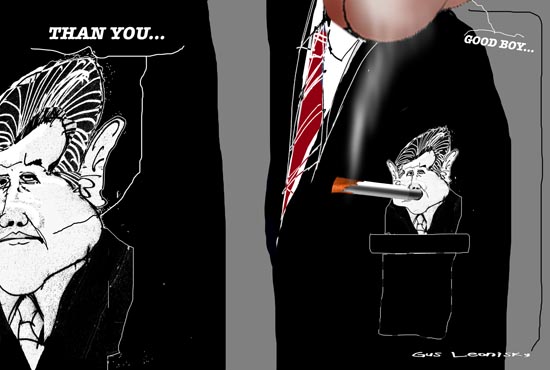Search
Recent comments
- waste of euros....
23 hours 23 min ago - macron l'idiot....
1 day 1 hour ago - pomp and charity....
1 day 1 hour ago - overshoot days....
1 day 1 hour ago - "americamaidan"
1 day 1 hour ago - australia sux....
1 day 1 hour ago - the little children....
1 day 2 hours ago - delayed food....
1 day 9 hours ago - free expression....
1 day 10 hours ago - macrolympicus....
1 day 11 hours ago
Democracy Links
Member's Off-site Blogs
where there's smoke, there's health hazard...

Health credentials under fire: Coalition takes cash from Big Tobacco
The NSW Nationals have accepted $16,500 from tobacco companies this year, exposing the Coalition to more criticism from the Labor Party, which refuses to take tobacco company donations.
According to the Nationals' latest donations and expenditure disclosure lodged with the Election Funding Authority, British American Tobacco donated $13,200 to the party in April, while Philip Morris donated $3300 in March.
The tobacco companies are fighting state and federal governments over smoking bans, plain packaging and point-of-sale advertising restrictions.
From July 1, retailers in NSW have been required to keep cigarette displays under the counter or otherwise out of sight, and vending machines must be operated by staff.
In April, the then prime minister Kevin Rudd announced plans for cigarettes to be sold in plain brown packaging from 2012, adorned only with graphic health warnings and the brand in plain black typeface.
His successor, Julia Gillard, has indicated she will continue with the plan.
- By Gus Leonisky at 2 Oct 2010 - 8:19pm
- Gus Leonisky's blog
- Login or register to post comments
where there's smoke, there's tobacco...
The tobacco industry has long seen the advantage in financing and helping promote publicity for outspoken, media-savvy scientists who are prepared to challenge accepted views on smoking and health or various aspects of tobacco control, while appearing to be independent. Cooperation between the tobacco companies on a global scale has ensured that competent tobacco industry spokespeople have been shared. In Australia, it has been documented that at least nine visiting industry-sponsored scientists gained substantial publicity between 1969–1979, promoting a range of industry-friendly views debunking the health evidence about smoking. Over the years the views of these individuals were widely reported, often uncritically, by the news media. It is probable, given the timing and content of some of these publicity initiatives, that tobacco industry consultants adversely influenced the course of tobacco control initiatives in those early days.
In the late 1970s and into the 1980s, the Australian tobacco industry cultivated a home-grown dissenter, Sydney general practitioner Dr William Whitby, who self-published two books (Smoking is good for you and The smoking scare de-bunked). Although there is evidence that the industry recognised that Dr Whitby's particular brand of pro-smoking fanaticism might pose a liability, it nonethless provided the means for his views to be widely disseminated and Whitby's works were retained in the armoury of international tobacco circles well into the 1990s.
The tobacco industry adopted similar techniques in efforts to subvert the accumulating medical evidence on second-hand smoke, as well as deflecting attempts to introduce bans on tobacco advertising and other forms of regulation of tobacco products in Australia and internationally. For example Philip Morris and other international companies collaborated to promote the views of scientists holding views on SHS counter to those of mainstream health authorities throughout Asia, Europe and the USA during the 1980s and 1990s. During the 1980s BAT 'ghost-wrote' reports for JJ Boddewyn published by the International Advertising Association and designed to counter bans on tobacco advertising. The Boddewyn reports on advertising were widely circulated internationally (including in Australia) and formed the basis of industry campaigns to oppose advertising bans.
http://www.tobaccoinaustralia.org.au/chapter-10-tobacco-industry/10-20-tobacco-industry-lobbying-the-tools
-----------------------
Gus: many of my smoking friends died young, before or around forty, including my uncle Roberto who did not smoke in his sleep because he never slept...
smoke signals...
By DUFF WILSON
As sales to developing nations become ever more important to giant tobacco companies, they are stepping up efforts around the world to fight tough restrictions on the marketing of cigarettes.
Companies like Philip Morris International and British American Tobacco are contesting limits on ads in Britain, bigger health warnings in South America and higher cigarette taxes in the Philippines and Mexico. They are also spending billions on lobbying and marketing campaigns in Africa and Asia, and in one case provided undisclosed financing for TV commercials in Australia.
The industry has ramped up its efforts in advance of a gathering in Uruguay this week of public health officials from 171 nations, who plan to shape guidelines to enforce a global anti-smoking treaty.
This year, Philip Morris International sued the government of Uruguay, saying its tobacco regulations were excessive. World Health Organization officials say the suit represents an effort by the industry to intimidate the country, as well as other nations attending the conference, that are considering strict marketing requirements for tobacco.
Uruguay’s groundbreaking law mandates that health warnings cover 80 percent of cigarette packages. It also limits each brand, like Marlboro, to one package design, so that alternate designs don’t mislead smokers into believing the products inside are less harmful.
The lawsuit against Uruguay, filed at a World Bank affiliate in Washington, seeks unspecified damages for lost profits.
“They’re using litigation to threaten low- and middle-income countries,” says Dr. Douglas Bettcher, head of the W.H.O.’s Tobacco Free Initiative. Uruguay’s gross domestic profit is half the size of the company’s $66 billion in annual sales.
Peter Nixon, a vice president and spokesman for Philip Morris International, said the company was complying with every nation’s marketing laws while selling a lawful product for adult consumers.
http://www.nytimes.com/2010/11/14/business/global/14smoke.html?hp=&pagewanted=print
--------------------
Gus: here in Australia, the law is that ciggie packets need to be hidden from view at point of sale and soon ALL packets will be a uniform drab grey...